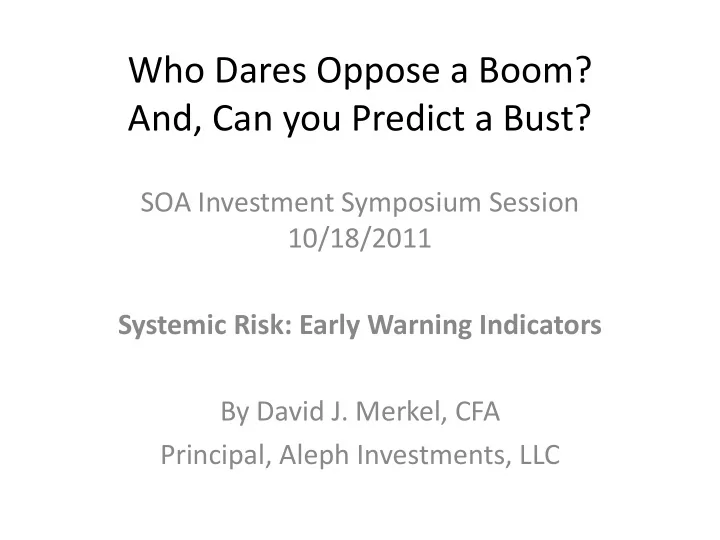

Who Dares Oppose a Boom? And, Can you Predict a Bust? SOA Investment Symposium Session 10/18/2011 Systemic Risk: Early Warning Indicators By David J. Merkel, CFA Principal, Aleph Investments, LLC
Disclaimer • David Merkel is an investment professional, and like every investment professional, he makes mistakes. David encourages you to do your own independent "due diligence" on any idea that he talks about, because he could be wrong. Nothing written here, at RealMoney, or anywhere else David may write is an invitation to buy or sell any particular security; at most, David is handing out educated guesses as to what the markets may do. David is fond of saying, "The markets always find a new way to make a fool out of you," and so he encourages caution in investing. Risk control wins the game in the long run, not bold moves. Even the best strategies of the past fail, sometimes spectacularly, when you least expect it. David is not immune to that, so please understand that any past success of his will be probably be followed by failures. • Also, though David runs Aleph Investments, LLC, this is not intended as advertisement for Aleph Investments; David is not soliciting business through it. When David, or a client of David's has an interest in a security mentioned, full disclosure will be given, as has been past practice for all that David does on the web. Disclosure is the breakfast of champions. • Additionally, David may occasionally write about accounting, actuarial, insurance, and tax topics, but nothing written here, at Aleph Blog, or anywhere else is meant to be formal "advice" in those areas. Consult a reputable professional in those areas to get personal, tailored advice that meets the specialized needs that David can have no knowledge of. • All images in this article are public domain, to the best of my knowledge.
The Challenge The U.S. Congress recently passed the most sweeping financial reform measure since the Great Depression. The purpose of this legislation is to prevent the risky behavior and decision-making that led to the financial crisis, and to prevent future crises. • Does this legislation solve the problems of the past? • Are there other significant issues not addressed? • Does this legislation cause other concerns? • In reflecting on the events of the last two years, is it possible to effectively develop early warning indicators that trigger intervention in advance of a complete collapse of an entire financial system or market? • Does it make sense to have a chief risk officer of, say, the United States of America, whose role it would be to manage/mitigate this risk?
The Choice
Economics or Politics? • Economics: Did regulators not have sufficient latitude and knowledge/tools to deal with the growing problems? • Politics: Or was it a lack of willingness to address problems?
The Nature of Booms The fool does at the end of a bull market what the wise man does at its beginning. Wall Street Aphorism
Booms Usually Start Well • Equity finance • High return on Assets • Took some work to make the decision
Success Breeds Imitation • Opportunity becomes better known • Deals are lower quality • ROA is slipping • Financing more available
Can Become Faddish • Opportunistic capital shows up • Drives up prices / Short term finance • Momentum psychology builds • “Everyone is doing it”
Tend to Last Longer Than Reasonable • There are naysayers, but they are derided as mindless bears trying to scare a fundamentally sound market for financial gain. • Bull cycles in credit take a long time to play out. • Leverage rises, spreads grind tighter, complexity increases.
Conditions at the End of the Boom • Indebtedness high • Short-term finance prevalent • ROAs are low • Opportunistic capital fully deployed • Long-term players w/flexibility are gone • Players have to feed the asset to keep it. • Average player IQ is low.
Can You Spot an Unsustainable Boom?
Spot the Large Debt Increases Credit: Morgan Stanley
Stop the Large Debt Increases? • Easy to SPOT; easy to POST; hard to STOP. • Disbelief • Derision • Political-connectedness • Regulatory capture / Revolving door • Near the end of a credit cycle loss statistics typically look good. • Economists think debt is neutral • Favorable trend helps governments in short-run
Who Dares Oppose a Boom? • Hedge Funds • Value Investors • Leftists • Cranks • No one with any real political power ever opposes a boom
Quis custodiet ipsos custodes?
Can Systemic Risk be Controlled?
Can Systemic Risk be Controlled?
Can Systemic Risk be Controlled?
Can Systemic Risk be Controlled?
Can Systemic Risk be Controlled?
Systemic Risk Can Be Detected • Low credit spreads and equity volatility • Low TED spreads • High implicit leverage at the banks • High levels of short term lending/borrowing • Credit complexity and interconnectedness • Poor Credit Underwriting • Carry trades are common
And Then You Wait
Summary • Politically difficult to stop booms; everybody loves them while they are going. • Regulators had more than enough tools to deal with credit and leverage issues. They did not use them. Why will they use the new tools next time? • Let the government focus on underlying regulatory capture and try to prevent it. • Let the banking regulators set real leverage, ALM, counterparty, and other limits for banks. • Who will limit the Fed and its monetary policy? When will they realize that systemic risk is largely their creation? • Do we have the backbone to fire regulators that have failed? • When will we as a culture accept that smooth permanent prosperity is not possible, and toss out the politicians that promise prosperity? We should know they can’t deliver.
Contact Data David J. Merkel, CFA david.merkel@gmail.com http://alephblog.com Aleph Investments, LLC aleph.investments@gmail.com 410-750-7894
Recommend
More recommend